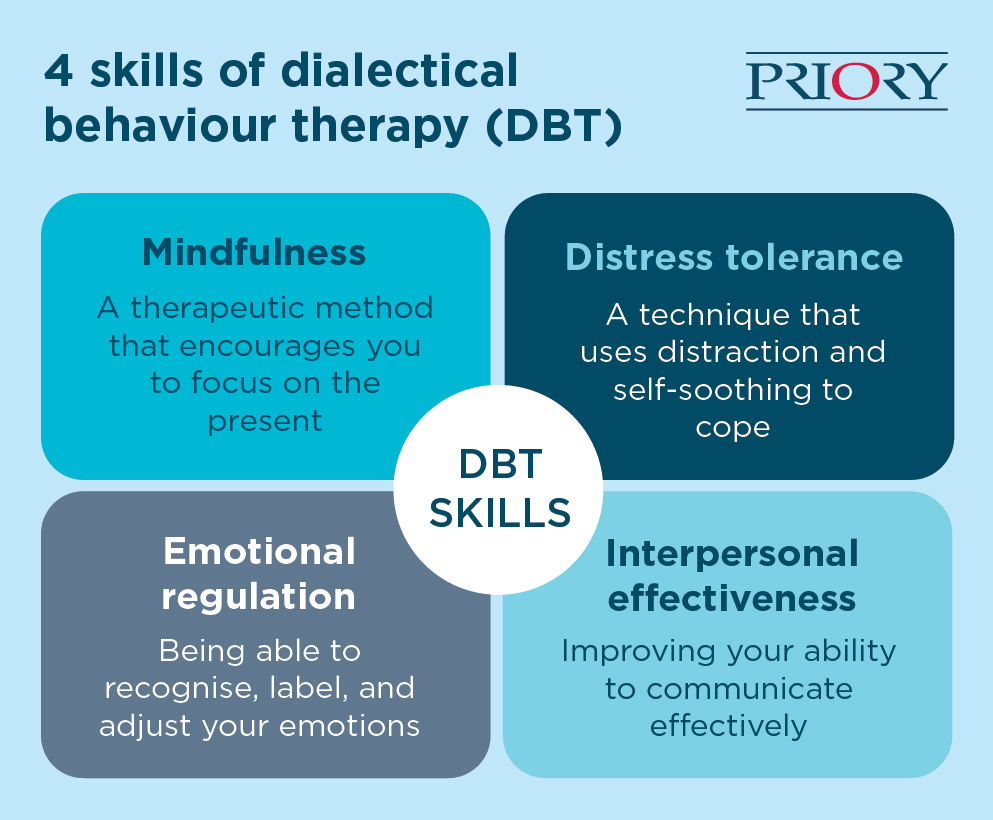Dialectical behaviour therapy (DBT): what it is, how it works and who can use it
The skills and strategies adopted during DBT, and how it might benefit your recovery and wellbeing.
Dialectical behaviour therapy (DBT) is an evidence-based psychotherapy method and a third wave version of cognitive behavioural therapy (CBT). CBT focuses heavily on changing our thoughts, whereas DBT focuses on accepting and changing our behaviours. It was developed by Dr Marsha Linehan and colleagues in the late 1980s. Its basic principles help people to develop healthier thought patterns and strategies for regulating emotions.
Originally developed as a treatment for people with emotionally unstable personality disorder (EUPD), DBT has now developed into a leading treatment for people who struggle with emotional instability. If you’ve been struggling with a mental health condition, DBT could be an effective way to take control of your condition and improve your wellbeing.
The word ‘dialectical’ gets to the core of how DBT works. It comes from the idea that two different beliefs or thoughts, that seem to be the opposite of each other, can both be simultaneously true.
In DBT, these opposing ideas are acceptance (accepting yourself) and change (changing your behaviour). DBT teaches us that these two goals are both achievable at the same time.
DBT’s other focus area is borrowed from CBT. Both DBT and CBT can help you to change destructive, damaging or otherwise unhelpful ways of thinking or behaving. In essence, the acceptance strategies of DBT are added to the behavioural change strategies that are central to CBT.
For people who've been struggling with conditions such as personality disorders, anxiety or eating disorders, DBT can be an effective treatment that helps you manage your condition and continue to thrive. It can be thought of as a type of cognitive and emotional rehabilitation for people who've suffered exposure to long term stress or sudden acute trauma.

DBT skills and techniques will teach:
Mindfulness: a therapeutic method that encourages you to focus on the present. With skills in mindfulness, you’ll be more aware of your feelings, thoughts, emotions and impulses in the moment. Mindfulness can help you to stay calm and avoid negative thought patterns and behaviours. Mindfulness is the cure for an agitated mind. It's a skilful way to take hold of the mind, so the mind doesn't take hold of you. In other words, mindfulness is a form of attention retraining.
Distress tolerance: an ability to recognise and accept intense emotions, such as anger and frustration, without feeling the need to react in an extreme or impulsive way. Distress tolerance uses techniques such as distraction and self-soothing to cope with intense feelings in the moment, so that we don't make our problems worse.
Emotional regulation: being able to recognise, label, and adjust your emotions. With better emotional regulation, you're more able to cope with intense negative emotions, harnessing a more positive long-term emotional outlook, and solve your problems effectively in ways that stand the test of time.
Interpersonal effectiveness: focuses on improving your ability to communicate effectively, helping you to foster healthy relationships. You’ll learn to speak more assertively, how to say ‘no’, be a better listener, and deal with challenging people more effectively.
DBT can be adopted in many different settings. Group therapy, where these skills are developed as part of a group, is common in DBT, but it is also often delivered in one-to-one and online therapy sessions.
Since DBT was first used as a therapeutic technique, it’s shown that it can produce a whole range of benefits for people with mental health problems. These include:
Patients who benefit from DBT are often people who appear to be living chaotically, seem to be in a constant state of ‘crisis’, or those who feel emotions very strongly.
Typically, people who benefit from DBT can struggle with:
You find sudden changes in emotions are common and have difficulty returning to a calm emotional baseline. For example, you might feel devastating grief where sadness would be expected, humiliation in place of disappointment and destructive rage instead of anger. You may also experience extreme feelings of rejection, failure, isolation and a sense of victimisation.
You might attempt to cope with emotional dysregulation in ways that are frequently harmful, or that do not stand the test of time. Impulsive behaviours are common, including substance or alcohol abuse, reckless spending, risk-taking, self-harm and suicidal behaviour. Impulsive behaviours might lead to ending of friendships and relationships or losing your job. People who struggle to regulate their emotions may enter a harmful cycle of engaging in the above behaviours, leading to intense shame and guilt, and further unhelpful attempts to soothe their emotional pain.
Despite its roots as a treatment for EUPD, DBT is also used to successfully treat a variety of mental health conditions, such as:
To get started with DBT, you can book a private mental health assessment through our free online portal, Priory Together. This helps us understand your needs and ensure DBT is the right approach for you. If you'd prefer to speak to someone first, you're welcome to give us a call or use our online chat function - we're here to help you begin your road to better mental health in the way that feels right for you. To find out more, including how to register with Priory Together, please visit our private mental health assessments page.